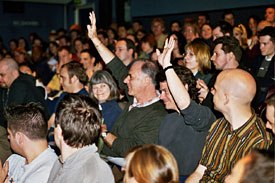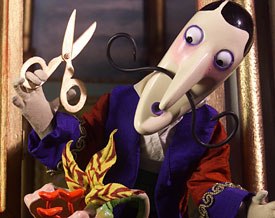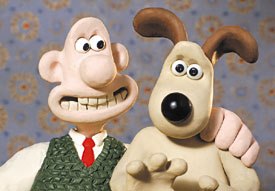Andrew Osmond struggles from the crowds to report on Bristol's fourth Animated Encounters festival, with guest appearances from Ray Harryhausen and Bob Godfrey.

Professionals and students alike crowd the floor at Animated Encounters. All photos from the festival are courtesy of Animated Encounters.
Each year, the first floor of the Watershed Media Centre in Bristol seems to get more congested, as animation students, professionals and plain fans queue for the next event on the festival program. At times, it can be difficult to move between the cinema and the equally crowded bar, but no one looks seriously put out. Maybe it's just the British tolerance for queuing, but there's a real sense of everyone enjoying themselves, making the odd tight squeeze worthwhile.
Squeezing seems to have been the watchword for Bristol's fourth Animated Encounters, with the main events fitted into a mere two days (May 9 and 10, a Friday and Saturday). Obviously, this was good news for anyone deterred by hotel bills, but it did mean that if you wanted value for money, you'd have little breathing space between events six or seven hours of lectures or screenings could get frazzling.
Still, at least there was plenty to see: two alternate line-ups of industry seminars, plus seven film programs and the chance to see Bob Godfrey (Roobarb and Custard, Henrys Cat) and Ray Harryhausen (c'mon, you know who he is!) swapping reminiscences. True, it was a more modest menu than previously last year's four-day event offered 11 screenings but it felt less like downsizing than compression, with most of the good stuff kept in.

Ray Harryhausen moulds a skeleton from Jason and the Argonauts.
Technically, things started on Thursday night with a screening of the Oscar-winning Japanese feature Spirited Away, but this was a guest-only event for sponsors and not, the U.K. distributors were anxious to stress, any kind of official premiere. (The film will open in Britain later this year.) Pity, as plasticine supremo Nick Park reportedly read a message from Hayao Miyazaki, the kind of cross-cultural, cross-media exchange it would have been great to see.
Friday was Industry Day, or rather days, with two to choose from. Day A was aimed at students just starting out in animation, while Day B was for a more "advanced" audience. In the Day A strand, I caught the 'making-of' presentation on Home Road Movies, winner of the Cartoon D'Or award last year, which was hosted by director Robert Bradbrook and producer Dick Arnall. As Home Road Movies was an autobiographical film, based on Bradbrook's father, there was plenty to say on both the personal and professional level.
On the practical side, Bradbrook emphasized how a "short" film schedule could extend as if by magic, and why computer models are so much easier in night scenes. More touchingly, he spoke of his qualms about how his siblings would respond to his depiction of their late father. They had no worries about an actor juxtaposed with images of their 'real' mother, but raised hell when Bradbrook suggested changing their car!
I couldn't get to the other "A" events a master class on digital and interactive animation presented by Channel 4, and a panel with the self-explanatory title, "Inside the Head of a Development Executive." From the response of other attendees, however, it seems both went off well.
Meanwhile, a "B" panel discussed feature production in the U.K., buoyed by the number of projects on these shores (the Bolex brothers' Magic Roundabout, the CGI film Valiant, Aardman's recently confirmed Wallace and Gromit movie). While the subject was interesting, I couldn't help feel as with similarly broad-based panels I've been to that it was too wide and diverse for a truly profitable discussion. After all, as the panelists emphasized, there are so many potential ways to make a feature, tailoring it to your budget, your target audience and, indeed, your target medium (Iain Harvey, who produced Jimmy Murikami's version of A Christmas Carol, was bullish about its video prospects).

Nick Park reads a specially written message to the audience from Hayao Miyazaki at the opening event, a screening of Spirited Away.
The main conclusion was fairly platitudinous that U.K. animators should learn from American majors without losing their British "quirkiness." Co-funders don't need to be American Magic Roundabout is being made without U.S. money and one has to weigh the benefits of Hollywood distribution against the prospect of most profits staying stateside.
On the anecdotal side, there were a couple of eye-openers, like the tantalizing snippet that Ozzy Osbourne (yes, that Ozzy Osbourne!) was sought after for the spaced-out rabbit Dylan in Magic Roundabout. It didn't happen, alas! Meanwhile, Michael Rose, who executive produced Aardman's Tortoise on hiatus and shift gears to Park's bald inventor and dog.
The features panel was followed by one on writing for animation, featuring some Mr. Hell scribes and Pond Life creator Candy Guard. Among the topics were the agonies of unhelpful story editors ("I would not have written it like this!") and a difference of opinion over whether "too much talk" killed toon comedy (yes, The Simpsons was brought up).

The audience for Animated Anecdotes was treated to an evening with Ray Harryhausen (left) and Bob Godfrey (right). Comedian Andre 'Vinnie' Vincent hosted the event.
Guard revealed her material was ripped off for a PG Tips chimp advert, while a writer for Cosgrove Hall's Foxbusters show noted that the "sneak it in" gag ethos of Termite Terrace was alive and well. Foxbusters had been up for consideration by U.S. buyers, but they were put off by certain voice over comments on the barnyard action. Example: "The goats were doting, the sheep were leaping, and the ducks were getting on really well." (Did you have to read it twice?)
The last "B" panel was a solid "making-of" panel on Future is Wild, the future evolution series aired on the Discovery Channel and animated by the British studio 422 South. (By the way, it's not connected with Framestore's Walking with Dinosaurs, despite the thematic parallels.) Plenty of Photoshop mock-ups and animatic works in progress, and I got a better idea of how the "meter rule'" vital for judging scale in these live-action/CG hybrids is used. There was a hilarious demo of how an animator misinterpreted directions, leading to the campiest critter I've seen on screen.
Also on the industry side, the digital channel BBC Three launched a new animation award scheme, looking for "cutting edge characters and a storyline to match." The first prize is development of your own series (whoa!). More details can be found on the BBC Website, under "Talent."
The fun stuff started on Friday evening with "Animated Anecdotes," the chance to see Bob Godfrey and Ray Harryhausen in conversation. Caveats first: putting these two very different animators together felt like Disney's double-billing of Ichabod and Mr. Toad. It must also be said that comedian-host Andre Vincent was a little more awkward in the role than Encounters regular Phil Jupitus. While Jupitus could happily debate the merits of Avery, Jones and Clampett, Vincent had to ask what rotoscoping was. Jokey, enthusiastic hosts are all very well, but would it hurt to have someone who knew a little about the subject?

Shelly Wain's The Love Nest was presented in the international program. © COG Ltd. and Shelly Wain.
Then again, it didn't really matter much. Both grand old men were in lively, cheerful form, happily talking through their careers with apposite clips. As influences, Harryhausen selected the T-Rex battle from King Kong, while Godfrey plumped rather to Vincent's surprise - for the "Bella Notte" serenade in The Lady and the Tramp, an exemplar of human-level emotion. Harryhausen brought out a Jason skeleton (reducing Vincent to a gushing fanboy) and Godfrey had plenty to say on his Oscar-winner Great (about Ismbard Brunel) and his much-loved TV show Roobarb and Custard. Shame there wasn't time for Karma Sutra Rides Again...
Apart from the party, that was it until Saturday, and the marathon of short screenings from Britain, Europe and worldwide. Shorts are very much a matter of individual taste, and, given the quantity, it'd be churlish to complain. Still, there seemed slightly fewer really good films this year, though there were plenty of solid entries I was grateful to see.

The Catheral represented CG animation at the festival. © 2002 Platige Image.
Among the programs was a strand from England's Manchester Studio, ranging from DangerMouse and Bob the Builder to Barry Purves' sublimely tragic Screen Play. A newer title was Mike Kirwin's enjoyable pop promo Another Point of View. Its 3D cardboard world was created in seven weeks flat for DB Boulevard. Elsewhere, Robbie and the Vikings, the new adventure of Robbie the Reindeer, was premiered. Directed by Peter Peake, the half-hour film hardly knocked back the walls of the medium, but it was still fair fun.
An "International" program let us contrast the CG slickness of Oscar nominees The Cathedral, ChubbChubbs and Mikes New Car (the latter spun off from Monsters, Inc.) to the manic kids'-scrawl primitivism of Christopher Hinton's Flux, which I thought held up well.
On the British side, Love Nest by Shelley Wain was a graceful if slightly conventional stop-motion fairy tale (one gross moment apart). Viv Jones' The House, based on drawings by mental health patients, used live-action and animation in a dynamic treatment of a potentially 'worthy' subject. Another hybrid, Dad's Dead by Chris Shepherd, effectively conveyed the nasty world-view of angry adolescents, while Will Becher's Boxed In made adroit stop-motion use of a classic situation an old man versus a mouse with a brilliant last gag.
More stop-motion rodents were used to good effect in Sam Fell's Big Cheese, a cute-nasty film from 1991 shown in a retrospective on Channel 4's Animator in Residence scheme. (U.K. readers may have seen the residents, scribbling away in a cubicle in London's IMAX cinema). The program offered more familiar shorts like Ruth Lingford's dark folktale Death and the Mother, and Thorsten Reinth's alienated Cri (both from 1997).

A panel discussion on production in the U.K. noted that Aardman will be producing a feature version of Wallace and Gromit soon. © Aardman/W & G Ltd. 1989.
It's typical of these kind of films that I remember thinking Cri was absurdly portentous when I first saw it, but very effective this time round. I wasn't too taken with Lingford's new film, the characteristically glum The Old Fools, but maybe next time...
More fun were the whimsical French drawn offerings, So Many Dogs, by Stephane Ricard, and Pipsqueak Prince, by Zoya Trofiimova. Another great punchline here, which some humorous cartoons seemed to lack. The film which went down least well (at least with the people around me) was Spain's I'll Water Your Petals With Tears, directed by Juan Carlos Mari, a risibly overwrought tale of a rose and a raindrop.
The overall audience favorite (though not my own) was another French film, Tim-Tom, by Christel Pougeoise and Romain Segaud. This had heroes with sketchpad heads and echoes of Duck Amuck and Osamu Tezuka's Broken Down Film. Tim-Tom will go forward to Cartoon D'Or.
Anything else? Oh yes, I forgot the late night "Saints and Sinners" program, Encounters' mandatory slot for transgressive animation. The theologically-slanted titles included the well-made but hardly provocative Promised Land by Gili Dolev, a lament on the Israel-Palestine situation. I confess I was sick enough to laugh at the seriously warped boy-and-his-dog spoof Davey and the Son of Goliath by Corky Quakenbush (it was so obvious, someone had to do it).
But the shocker was the very naughty Four Wishes, a 1987 French film by Michel Ocelot. That Michel Ocelot? The man who made the charming Kirikou and the Sorceress, doing a skit about a husband and wife endowed with rather too many genitals? Say it ain't so...
Andrew Osmond is a freelance writer specializing in fantasy media and animation.







